Chevrolet Equinox Service Manual: Brake Pipe Replacement
Special Tools
CH-45405Brake Pipe Flaring Kit
For equivalent regional tools, refer toSpecial Tools.
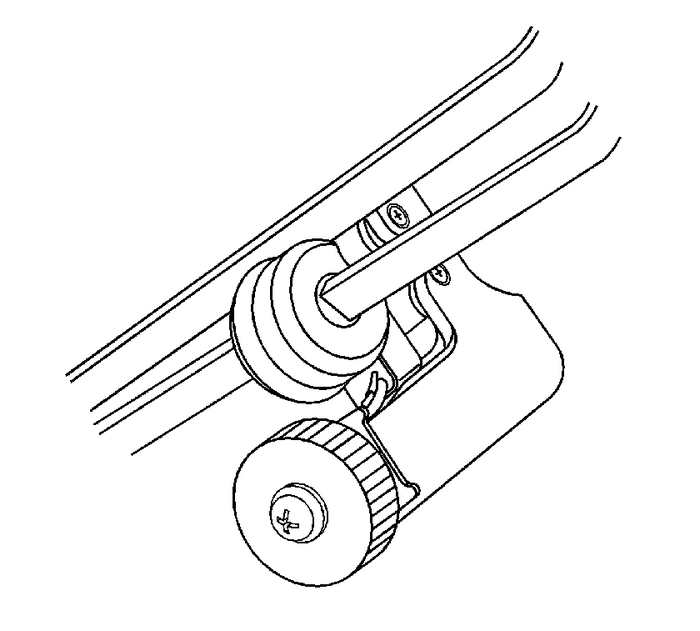
Warning:Refer toBrake Fluid Irritant Warning.
Warning:Always use double walled steel brake pipe when replacingbrake pipes. The use of any other pipe is not recommended and maycause brake system failure. Carefully route and retain replacementbrake pipes. Always use the correct fasteners and the originallocation for replacement brake pipes. Failure to properly route andretain brake pipes may cause damage to the brake pipes and causebrake system failure.
Caution:Refer toBrake Fluid Effects on Paint and Electrical Components Caution.
Note:When servicing the brake pipes, note the following:
If sectioning the brake pipe, use replacement pipe of thesame type and outside diameter.Use fittings of the appropriate size and type.Only create flares of the same type or design as originallyequipped on the vehicle.Inspect the area of brake pipe to be repaired orreplaced.Release the brake pipe to be replaced from the retainers, asrequired.Select an appropriate location to section the brake pipe, ifnecessary.Allow adequate clearance in order to maneuver theCH-45405Brake Pipe Flaring Kit.Avoid sectioning the brake pipe at bends or mountingpoints.Using a string or wire, measure the length of the pipe to bereplaced including all pipe bends.Add to the measurement taken the appropriate additionallength required for each flare to be created.Specification
6.35-mm (0.250-in) for4.76-mm (3/16-in) diameter pipe9.50-mm (0.374-in) for6.35-mm (1/4-in) diameter pipe12.67-mm (0.499-in) for7.94-mm (5/16-in) diameter pipe
Note:Ensure that the brake pipe end to be flared is cut at asquare, 90 degree angle to the pipe length.
Using the pipe cutter included in theCH-45405Brake Pipe Flaring Kit, carefully cut the brake pipe squarely to the measuredlength.Remove the sectioned brake pipe from the vehicle.Select the appropriate size of brake pipe and tube nuts, asnecessary. The brake pipe outside diameter determines brake pipesize.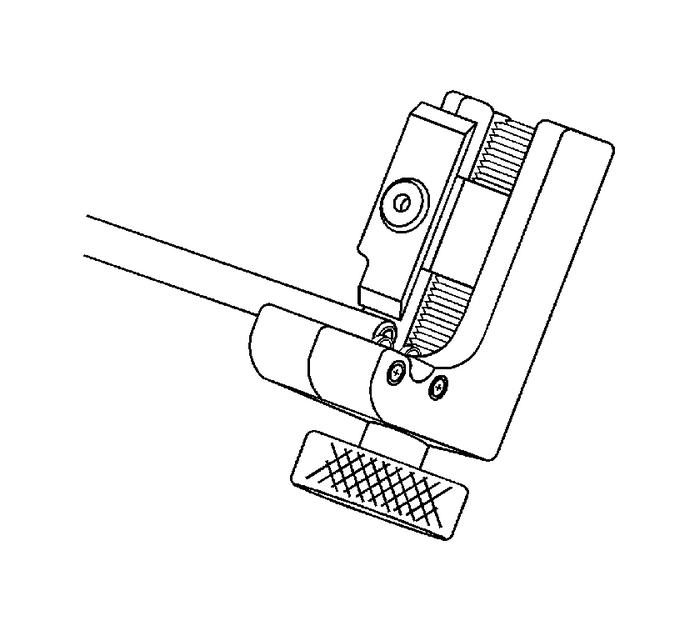
Strip the nylon coating from the brake pipe end to be flared,if necessary.Select the appropriate blade on the coating stripping toolincluded in theCH-45405Brake Pipe Flaring Kit, by unthreading the blade block from the stripping tooland installing the block with the desired blade facing the toolrollers.
Specification
6.35-mm (0.250-in) blade for4.76-mm (3/16-in) diameter pipe9.50-mm (0.374-in) blade for6.35-mm (1/4-in) and 7.94-mm(5/16-in) diameter pipeInsert the brake pipe end to be flared into the strippingtool to the depth of the ledge on the tool rollers.While holding the brake pipe firmly against the strippingtool roller ledges, rotate the thumbwheel of the tool until theblade contacts the brake pipe coated surface.
Note:Do not gouge the metal surface of the brake pipe.
Rotate the stripping tool in a clockwise direction, ensuringthat the brake pipe end remains against the tool rollerledges.After each successive revolution of the stripping tool,carefully rotate the thumbwheel of the tool clockwise, in order tocontinue stripping the coating from the brake pipe until the metalpipe surface is exposed.Loosen the thumbwheel of the tool and remove the brakepipe.Note:Ensure that all loose remnants of the nylon coating have beenremoved from the brake pipe.
Inspect the stripped end of the brake pipe to ensure that theproper amount of coating has been removed.Specification
6.35-mm (0.250-in) for4.76-mm (3/16-in) diameter pipe9.50-mm (0.374-in) for6.35-mm (1/4-in) and 7.94-mm(5/16-in) diameter pipe
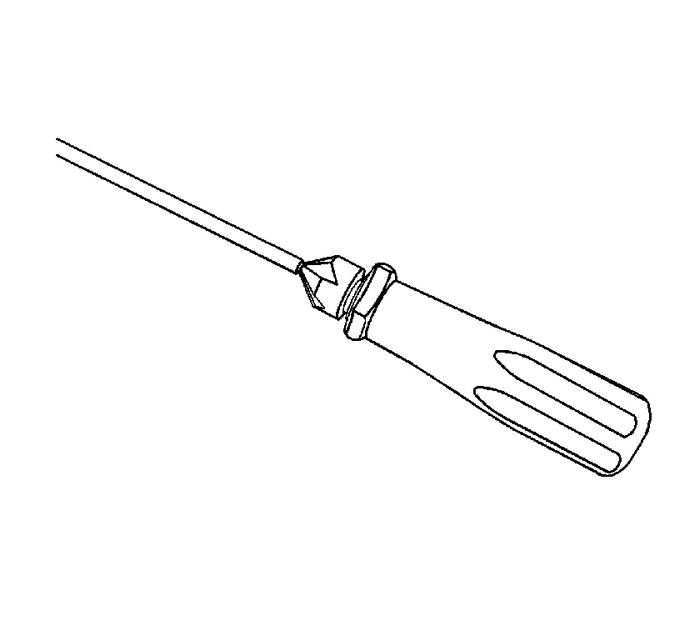
Chamfer the inside and outside diameter of the pipe with thede-burring tool included in theCH-45405Brake Pipe Flaring Kit.Install the tube nuts on the brake pipe, noting theirorientation.Clean the brake pipe and theCH-45405Brake Pipe Flaring Kitof lubricant, contaminants, and debris.
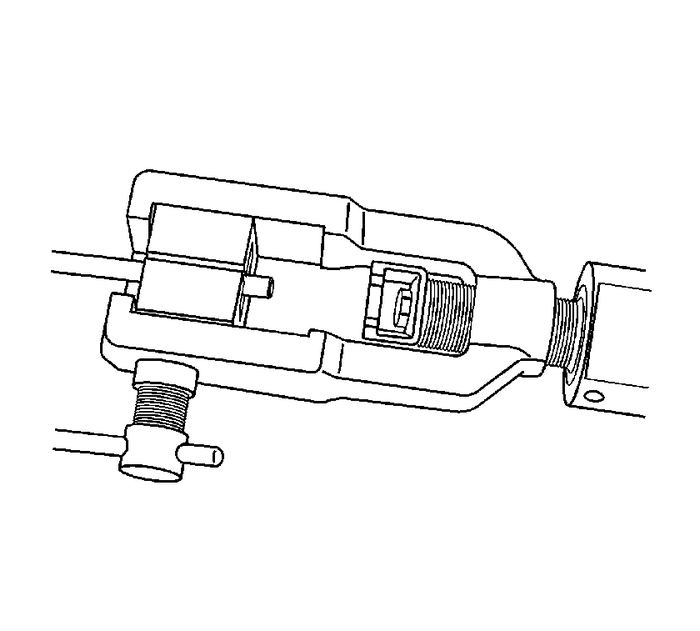
Loosen the die clamping screw of theCH-45405Brake Pipe Flaring Kit.Select the corresponding die set and install the die halvesinto the die cage with the full, flat face of one die facing theclamping screw, and the counterbores of both dies facing theforming ram.
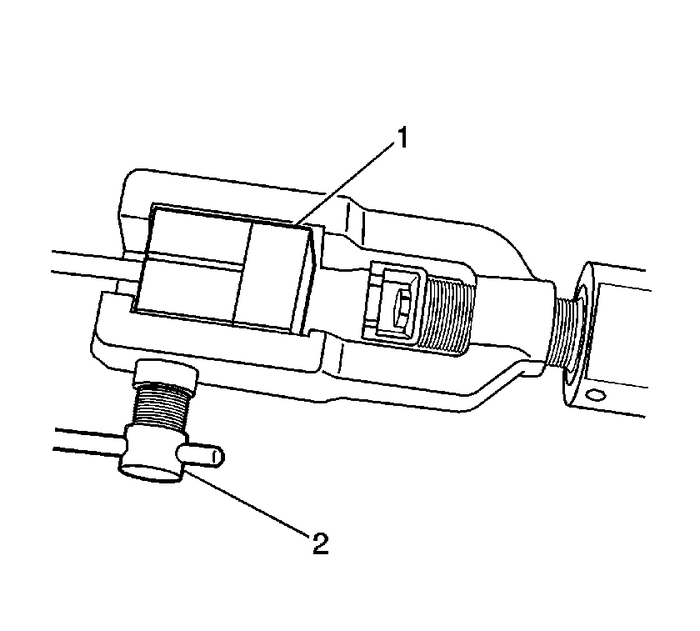
Place the flat face of an unused die-(1) againstthe die halves in the clamping cage and hold firmly against thecounterbored face of the dies.Insert the prepared end of the pipe to be flared through theback of the dies until the pipe is seated against the flat surfaceof the unused die-(1).Remove the unused die-(1).Ensure that the rear of both dies are seated firmly againstthe enclosed end of the die cage.Firmly hand tighten the clamping screw-(2) againstthe dies.
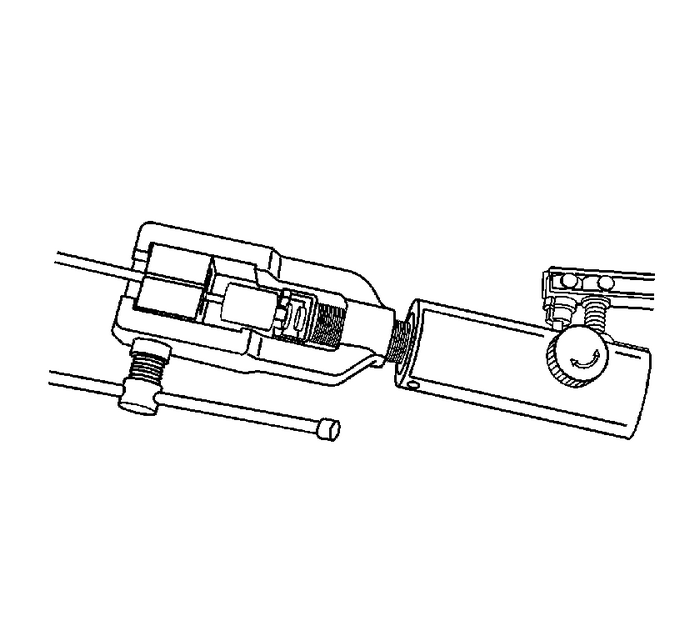
Select the appropriate forming mandrel and place into theforming ram.Rotate the hydraulic fluid control valve clockwise to theclosed position.Rotate the body of theCH-45405Brake Pipe Flaring Kituntil it bottoms against the die cage.
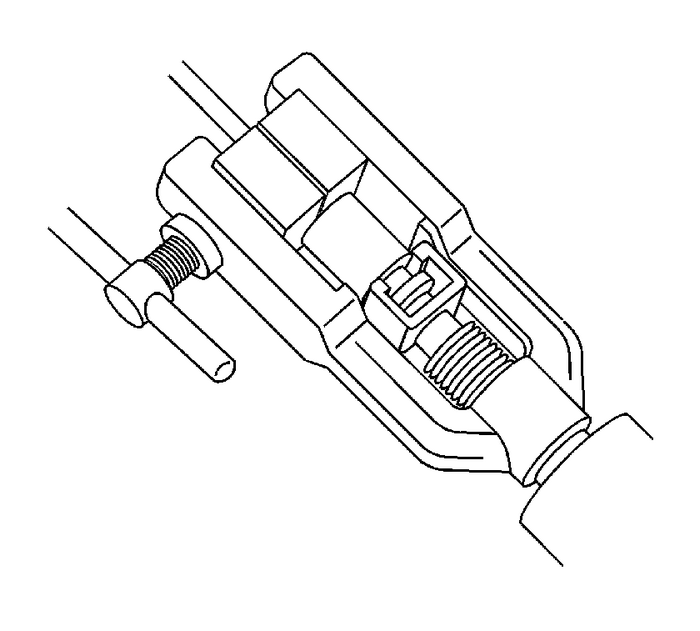
While guiding the forming mandrel into the exposed end ofpipe to be flared, operate the lever of theCH-45405Brake Pipe Flaring Kituntil the forming mandrel bottoms against the clampingdies.Rotate the hydraulic fluid control valve counterclockwise tothe open position to allow the hydraulic forming ram toretract.
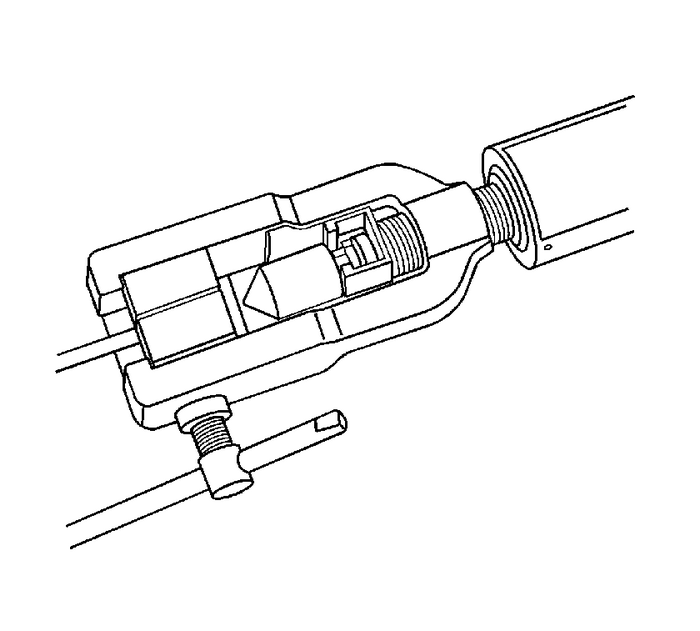
Insert the finishing cone into the forming ram.Rotate the hydraulic fluid control valve clockwise to theclosed position.Rotate the body of theCH-45405Brake Pipe Flaring Kituntil it bottoms against the die cage.While guiding the finishing cone into the exposed end of pipeto be flared, operate the lever of theCH-45405Brake Pipe Flaring Kituntil the finishing cone bottoms against the dies.Rotate the hydraulic fluid control valve counterclockwise tothe open position to allow the hydraulic forming ram toretract.Loosen the die clamping screw and remove the dies andpipe.If necessary, lightly tap the dies until the die halvesseparate.
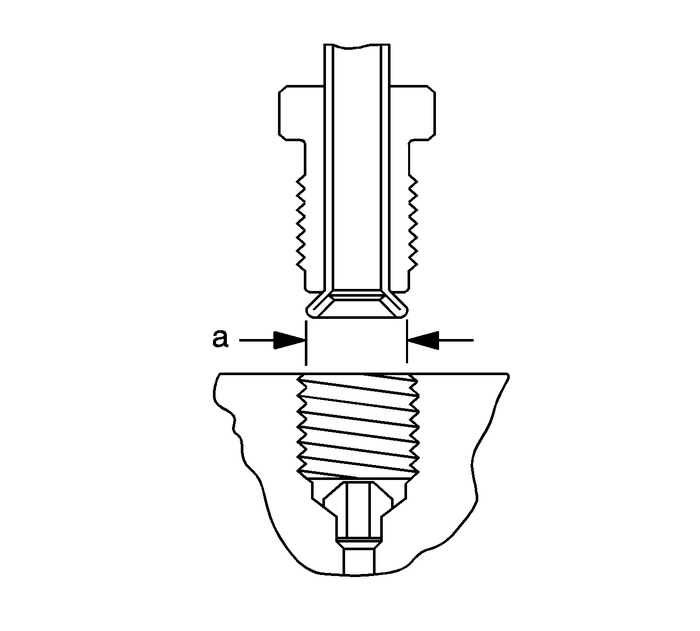
Inspect the brake pipe flare for correct shape anddiameter-(a).
Specification
6.74–7.10-mm(0.265–0.279-in) flare diameter for4.76-mm (3/16-in) diameter pipe8.57–9.27-mm(0.344–0.358-in) flare diameter for6.35-mm (1/4-in) diameter pipe10.42–10.79-mm(0.410–0.425-in) flare diameter for7.94-mm (5/16-in) diameter pipeIf necessary, using the removed section of brake pipe as atemplate, shape the new pipe with a suitable brake pipe bendingtool.
Note:When installing the pipe, maintain a clearance of19-mm (3/4-in) from all moving or vibratingcomponents.
Install the pipe to the vehicle with the appropriate brakepipe unions, as required.If previously released, secure the brake pipe to theretainers.Bleed the hydraulic brake system. Refer toHydraulic Brake System Bleeding.With the aid of an assistant, inspect the brake pipe flaresfor leaks by starting the engine and applying the brakes. Brake Rotor Assembled Lateral Runout Measurement Disc Brakes Brake Rotors
Brake Rotor Assembled Lateral Runout Measurement Disc Brakes Brake Rotors
Special ToolsCH-41013 Rotor Resurfacing KitCH-42450-A Wheel Hub Resurfacing KitCH-45101 Hub and Wheel Runout GaugeCH-45101-100 Conical Brake Rotor WashersFor equivalent regional tools, refer toSpecial ...
 Parking Brake Adjustment Parking Brake
Parking Brake Adjustment Parking Brake
Special ToolsJ-21177-ADrum-to-Brake Shoe Clearance GaugeWarning:Refer toBrake Dust Warning.Apply and fully release the park brake.Verify that the park brake pedal releases completely.Turn ON the ignit ...
Other materials:
Front Side Door Window Replacement Doors
Front Side Door Window ReplacementCalloutComponent NamePreliminary ProceduresPlace the window in the up down position.Remove front door trim panel. Refer toFront Side Door Trim Panel Replacement.Remove the front side door garnish molding. Refer toFront Side Door Garnish Molding Replacement.Remove th ...
